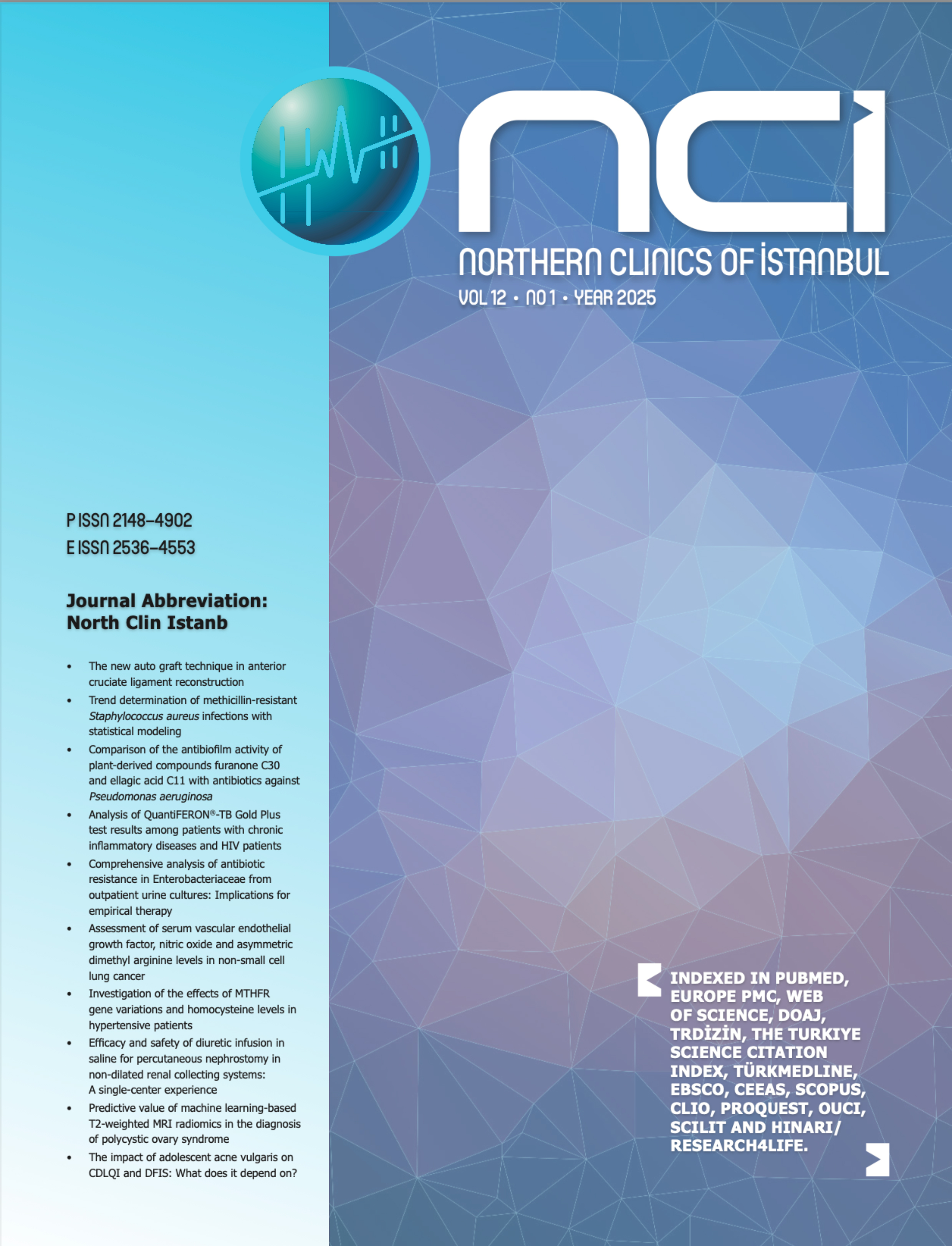General analysis of breast cancer patients tested for BRCA mutations and evaluation of acute radiotherapy toxicity
Sule Karabulut Gul1, Huseyin Tepetam1, Berrin Benli Yavuz2, Ozge Kandemir Gursel3, Ayse Altinok4, Irem Yuksel1, Omar Alomari5, Banu Atalar6, Ilknur Bilkay Gorken71Department of Radiation Oncology, University of Health Sciences, Kartal Dr. Lutfi Kirdar Training and Research Hospital, Istanbul, Turkiye2Department of Radiation Oncology, Necmettin Erbakan University, Meram Faculty of Medicine, Konya, Turkiye
3Department of Radiation Oncology, Prof. Dr. Cemil Tascioglu City Hospital, Istanbul, Turkiye
4Department of Radiation Oncology, Medical Park Bahcelievler Hospital, Istanbul, Turkiye
5University of Health Sciences, Hamidiye Faculty of Medicine, Istanbul, Turkiye
6Department of Radiation Oncology, Acibadem University Faculty of Medicine, Istanbul, Turkiye
7Department of Radiation Oncology, Dokuz Eylul University Faculty of Medicine, Izmir, Turkiye
OBJECTIVE: The objective of our study is to evaluate breast cancer patients with BRCA1 or BRCA2 gene mutations and compare them with patients without these mutations. Specifically, we aim to assess the acute side effects of radiotherapy in both groups.
METHODS: Data were collected from four participating centers, comprising information from 73 patients who underwent known mutation analysis and had complete data. Patients were monitored on a weekly basis throughout their treatment for acute toxicity, which was evaluated using the Radiation Therapy Oncology Group (RTOG) acute toxicity criteria.
RESULTS: The median age of the 73 patients included in our study was 43. Among them, 17 had BRCA1-positive mutations and 19 had BRCA2-positive mutations. Invasive ductal carcinoma was present in 67 patients, all of whom underwent surgery. Of the patients, 57 received conventional radiotherapy doses, while 16 received hypofractionated radiotherapy doses. During follow-up, metastasis occurred in three patients. In BRCA-positive patients, those under 40 years of age (p<0.001), with high nodal positivity (p=0.008), grade 23 (p=0.022), and lymphovascular invasion (p=0.002) were significantly more frequent compared to BRCA-negative patients (p<0.001). The median survival was 35.8 months. Grade 1 dysphagia developed in seven BRCA-negative patients and four BRCA-positive patients, with no significant difference observed between the two groups (p=0.351). There was also no statistical difference observed in the occurrence of grade 23 skin reactions, with 11 BRCA-negative patients and eight BRCA-positive patients experiencing these side effects.
CONCLUSION: Our study supports existing literature by identifying an association between the presence of BRCA mutations and young age, nodal status, grade, and lymphovascular invasion. Additionally, we found no significant difference in the occurrence of radiotherapy toxicity between BRCA-positive and BRCA-negative patients. These findings suggest that radiotherapy can be safely administered to BRCA-positive patients after breast-conserving surgery or mastectomy. Keywords for our study include breast cancer, BRCA mutation, radiotherapy, and side effects.
Meme kanseri hastalarında BRCA mutasyonları için test ve radyoterapi toksisitesinin değerlendirilmesi
Sule Karabulut Gul1, Huseyin Tepetam1, Berrin Benli Yavuz2, Ozge Kandemir Gursel3, Ayse Altinok4, Irem Yuksel1, Omar Alomari5, Banu Atalar6, Ilknur Bilkay Gorken71Sağlık Bilimleri Üniversitesi, Kartal Dr. Lütfi Kırdar Eğitim ve Araştırma Hastanesi, Radyasyon Onkolojisi Kliniği, İstanbul2Necmettin Erbakan Üniversitesi, Meram Tıp Fakültesi, Radyasyon Onkolojisi Anabilim Dalı, Konya
3Prof. Dr. Cemil Taşçıoğlu Şehir Hastanesi, Radyasyon Onkolojisi Kliniği, İstanbul
4Medical Park Bahçelievler Hastanesi, Radyasyon Onkolojisi Kliniği, İstanbul
5Sağlık Bilimleri Üniversitesi, Hamidiye Tıp Fakültesi, İstanbul
6Acıbadem Üniversitesi Tıp Fakültesi, Radyasyon Onkolojisi Anabilim Dalı, İstanbul
7Dokuz Eylül Üniversitesi Tıp Fakültesi, Radyasyon Onkolojisi Anabilim Dalı, İzmir
Amaç: Kalıtsal meme kanserlerinin çoğu, meme kanseri duyarlılık genleri BRCA1 veya BRCA2 mutasyonları nedeniyle meydana gelir. Bu mutasyonların varlığı, tümör hücrelerinin iyonize radyasyona ve DNA'ya duyarlılığını artırır ve kanser tedavisinin komplikasyonlarına karşı duyarlılığı da etkileyebilir. Çalışmamızın amacı, BRCA 1/2 mutasyon pozitif hastaları genel olarak değerlendirmek, radyoterapi akut yan etkilerini incelemek ve BRCA negatif hastalarla farkını belirlemektir.
Gereç ve Yöntem: Çalışmamıza katılmaya istekli dört merkeze veri tabanı gönderilmiştir. Tam verilere ve bilinen mutasyon analizine sahip 73 hasta dahil edildi. Hastalar, tedavi sırasında akut toksisite için haftalık olarak izlendi. Toksisiteler, RTOG akut toksisite kriterlerine göre değerlendirildi.
Bulgular: Ortalama yaş 43'tü, 17 hastada BRCA1 (+) ve 19 hastada BRCA2 (+) saptandı. Hastaların 67'sinde invaziv duktal karsinom mevcuttu. Tüm hastalara cerrahi işlem uygulanmıştı. Elliyedi hastaya konvansiyonel radyoterapi dozları verilirken, 16 hastaya hipofraksiyone radyoterapi dozları verildi. Takip sürecinde üç hastada metastaz gelişimi görüldü. Tüm BRCA pozitif hastaların invaziv duktal karsinomu bulunmaktaydı. BRCA pozitif hastalarda, 40 yaşın altındakiler (p<0.001), yüksek nodal pozitiflik (p=0.008), grade 2-3 (p=0.022) ve lenfovasküler invazyon (p=0.002) BRCA negatif hastalara kıyasla anlamlı olarak daha sık görüldü (p<0.001). Ortanca sağkalım süresi 35,8 aydı. Grade 1 disfaji, 7 BRCA negatif hastada ve 4 BRCA pozitif hastada görüldü; iki grup arasında anlamlı bir fark bulunmamaktaydı (p=0.351). Grade 2-3 cilt reaksiyonları ise 11 BRCA negatif hastada ve 8 BRCA pozitif hastada ortaya çıktı; istatistiksel olarak anlamlı bir fark bulunmamaktaydı.
Sonuç: Çalışmamızda, BRCA mutasyonlarının varlığı, literatürle uyumlu olarak genç yaş, nodal durum, grade ve lenfovasküler invazyon ile ilişkili bulunmuştur. Literatürde BRCA pozitifliğinin toksisite üzerinde etkisi bulunmamıştır ve çalışmamızdaki iki grup arasında yan etkiler benzerdir. Meme koruyucu cerrahi (MKC) veya mastektomi sonrası radyoterapi, BRCA pozitif hastalara güvenle uygulanabilir. (NCI-2023-5-8)
Manuscript Language: English





















